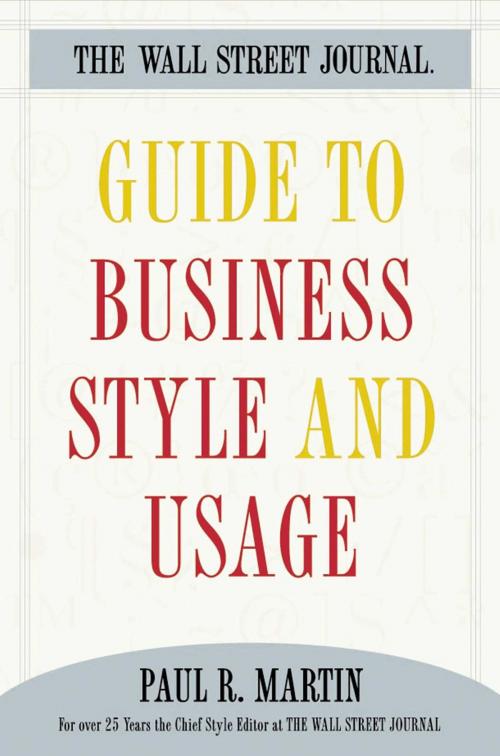The Wall Street Journal Guide to Business Style and Us
Nonfiction, Reference & Language, Language Arts, Writing & Publishing, Publishing, Business & Finance| Author: | Paul Martin | ISBN: | 9781439122693 |
| Publisher: | Free Press | Publication: | June 15, 2010 |
| Imprint: | Free Press | Language: | English |
| Author: | Paul Martin |
| ISBN: | 9781439122693 |
| Publisher: | Free Press |
| Publication: | June 15, 2010 |
| Imprint: | Free Press |
| Language: | English |
Here at last is the indispensable resource that has helped the writers and editors of The Wall Street Journal earn a reputation for the most authoritative business writing anywhere. Originally written exclusively for the paper's staff, The Wall Street Journal Guide to Business Style and Usage is a landmark work. Many years in preparation, it has now been expanded and revised for anyone who wants to write well, but especially for those in the business community. The only book of its kind, it offers A-Z guidance on style and usage, bearing in mind the special needs of business professionals and including the latest business terminology.
If ABC is no longer the American Broadcasting Company, what is it? What is the difference bet-ween "adjusted gross receipts" and "adjusted gross income"? How about the differences among "adopt," "approve," "enact" and "pass"? When should you say "affect" and when "effect"? When did Generation X end and Generation Y begin? And what the heck is the new name of Andersen Consulting? Our language is ever changing, ever mutating, and the choice of the right word bolsters your credibility with readers. As the go-to resource for these questions and others, The Wall Street Journal Guide to Business Style and Usage gives readers a competitive edge for succeeding in the world of business. It is an invaluable resource for any member of the business community who has ever had to write a memo, report, proposal, press release or e-mail.
Destined to be the standard resource for years to come, The Wall Street Journal Guide to Business Style and Usage provides readers with access to the Journal Web site (www.wsjbooks.com), which will feature updates as new business terms enter the language or as old definitions or usages give way to new. This guide is the definitive reference work to keep close to your desk -- the last word for everyone who works with words.
Here at last is the indispensable resource that has helped the writers and editors of The Wall Street Journal earn a reputation for the most authoritative business writing anywhere. Originally written exclusively for the paper's staff, The Wall Street Journal Guide to Business Style and Usage is a landmark work. Many years in preparation, it has now been expanded and revised for anyone who wants to write well, but especially for those in the business community. The only book of its kind, it offers A-Z guidance on style and usage, bearing in mind the special needs of business professionals and including the latest business terminology.
If ABC is no longer the American Broadcasting Company, what is it? What is the difference bet-ween "adjusted gross receipts" and "adjusted gross income"? How about the differences among "adopt," "approve," "enact" and "pass"? When should you say "affect" and when "effect"? When did Generation X end and Generation Y begin? And what the heck is the new name of Andersen Consulting? Our language is ever changing, ever mutating, and the choice of the right word bolsters your credibility with readers. As the go-to resource for these questions and others, The Wall Street Journal Guide to Business Style and Usage gives readers a competitive edge for succeeding in the world of business. It is an invaluable resource for any member of the business community who has ever had to write a memo, report, proposal, press release or e-mail.
Destined to be the standard resource for years to come, The Wall Street Journal Guide to Business Style and Usage provides readers with access to the Journal Web site (www.wsjbooks.com), which will feature updates as new business terms enter the language or as old definitions or usages give way to new. This guide is the definitive reference work to keep close to your desk -- the last word for everyone who works with words.















